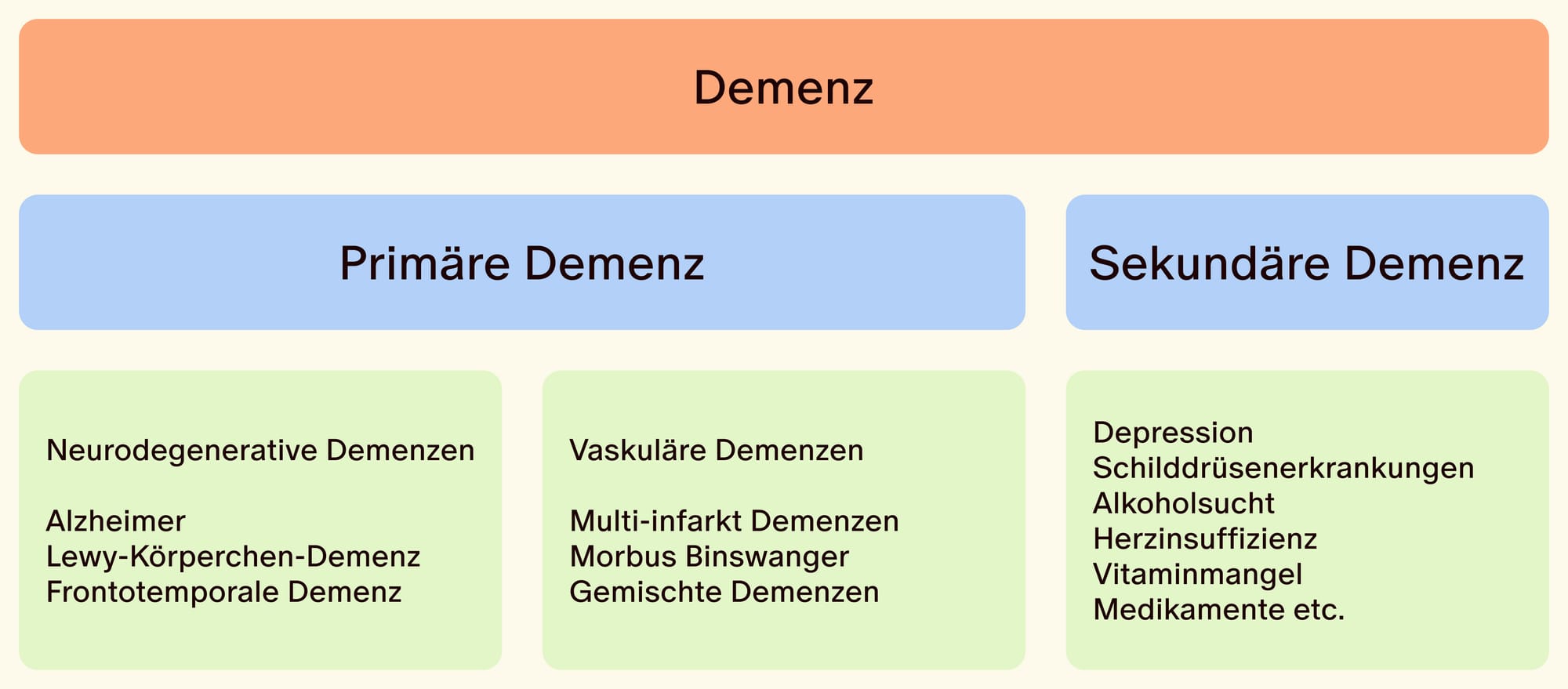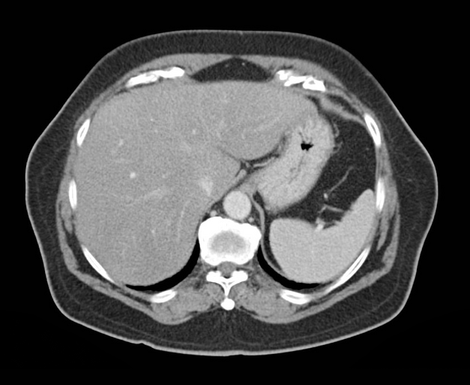Explore the diverse causes of dementia, from neurodegenerative processes to vascular issues.
The word dementia comes from Latin and literally translates to "away from the mind" or "without mind." This essentially describes the main characteristic of dementia – a deterioration of cognitive abilities leading to their complete loss. Dementia often begins with memory impairment, especially short-term memory. In advanced stages, it also affects long-term memory.
However, dementia is more than just a memory disorder; it is a complex condition. In later stages, it also negatively impacts language, orientation, attention, as well as comprehension and thinking skills. Consequently, dementia leads to a progressive loss of daily living skills, making it the most common cause of dependency in old age.
In Switzerland, about 1.7 percent of the population is currently affected by dementia. In Germany, the proportion is around 2.17 percent. Mostly older people are affected by dementia, but younger people can also develop it. If the first symptoms appear before the age of 65, it is referred to as "young onset dementia."
In this article, we delve into the causes of dementia. Understanding its causes is essential for prevention. To summarize: There are various causes of dementia, leading to different forms of the condition.
Key Facts
- Prevalence: Dementia affects 1.7% of people in Switzerland and 2.17% in Germany.
- Types: Primary (e.g., Alzheimer’s) are irreversible and make up 80-90%; secondary (e.g., due to vitamin deficiencies) can be treatable.
- Common Forms: Alzheimer’s, Lewy-Body, and vascular dementia; vascular is caused by blood flow issues and is the second most common.
- Causes: Include genetic factors, neurodegenerative changes, and blood vessel problems.
- Prevention: Healthy lifestyle, regular exercise, balanced diet, and managing health conditions like hypertension and diabetes.
What Types of Dementia Are There?
Dementia encompasses a variety of conditions characterized by a decline in cognitive abilities. Most dementia types have an organic brain cause and are currently incurable, resulting from degenerative changes or circulatory disorders in the brain. However, some forms of dementia stem from other underlying conditions and can be partially curable.
Primary and Secondary Dementias
Dementia is generally classified as primary or secondary. 80 to 90 percent of dementias are primary and mainly result from neurodegenerative changes, which are typically irreversible. The most common primary dementia is Alzheimer's disease (Alzheimer's dementia), also known as Morbus Alzheimer. Alzheimer's disease accounts for about two-thirds of all dementia cases and is characterized by neurodegenerative changes, or the death of brain cells.
Secondary dementias are consequences of other underlying conditions, such as vitamin deficiencies, metabolic disorders, thyroid diseases, chronic poisoning, or other neurological conditions like Parkinson's disease. Treating the underlying condition can often reverse dementia, but this applies to only a small proportion of dementia cases.
Neurodegenerative and Vascular Dementias
Alzheimer's disease is a neurodegenerative dementia, meaning it results from the death of nerve cells. Lewy body dementia (LBD) is another neurodegenerative disease, characterized by the pathological accumulation of proteins (Lewy bodies) in neurons. LBD accounts for an estimated 5 percent of all dementias. The rarest neurodegenerative dementia is frontotemporal dementia (FTD), making up 1 to 2 percent of cases, caused by the death of nerve cells in the frontal and temporal lobes of the brain.
There are also vascular dementias, typically caused by changes in the brain's blood supply, such as strokes. Risk factors include high blood pressure, smoking, high blood cholesterol, or diabetes mellitus. Vascular dementia is the most common form after Alzheimer's disease, accounting for about 15 to 20 percent of all dementia cases.
About 15 percent of cases are mixed forms of Alzheimer's and vascular dementia.

Development of Dementia
The exact causes of dementia are not fully understood. Alzheimer's disease is characterized by deposits of pathological beta-amyloid proteins (plaques) and tau proteins in the brain. These plaques are thought to trigger neurodegenerative processes responsible for Alzheimer's disease. Neurochemical changes can also contribute to Alzheimer's disease: affected individuals often have a deficiency of the neurotransmitter acetylcholine.
Vascular dementia is caused by impaired blood supply to the brain, including changes in blood vessels and strokes. Heart diseases can also be a cause. Undetected atrial fibrillation can trigger repeated, possibly unnoticed strokes leading to nerve cell death. Studies also show a link between high blood pressure and dementia.
Genetic predisposition plays a role, especially in familial Alzheimer's disease. Additionally, environmental factors and lifestyle can increase the risk of developing dementia.
Microorganisms, particularly in the gut and mouth, might also play a central role in dementia development. Studies show altered microbiota in Alzheimer's patients, suggesting these changes occur early in the disease. A study from Kiel found altered gut and oral microbiomes in Alzheimer's patients and those at risk, potentially linked to inflammation. Higher diversity of oral microorganisms, including bacteria associated with gum disease, might promote brain inflammation. Further research is needed to understand these mechanisms and develop therapies targeting the microbiome to delay Alzheimer's progression.
Diagnosis of Dementia
Dementia is not a normal part of aging but a serious medical condition requiring proper diagnosis and treatment. Diagnosing dementia involves a thorough assessment of cognitive functions, general health, and other potential causes of symptoms. The following steps are typically involved in diagnosing dementia:
- History and physical examination: A psychiatrist or neurologist conducts a thorough interview with the patient and possibly relatives to understand the symptoms and course of the disease. A physical examination is also performed to rule out other possible causes of the symptoms.
- Assessment of mental abilities: Various tests are used to evaluate the patient's cognitive performance and assess the severity of dementia. These include the clock test, Mini-Mental State Examination (MMSE), DemTect, Montreal Cognitive Assessment (MoCA), ADL scales, and the CERAD test battery.
- Imaging procedures: CT or MRI of the brain can detect structural changes and rule out other possible causes of the symptoms. Newer techniques like SPECT and PET can help clarify the diagnosis in unclear cases.
- Other procedures: Examination of cerebrospinal fluid can show characteristic changes in Alzheimer's disease. Blood tests are conducted to detect treatable causes of dementia early. A comprehensive diagnosis often requires a combination of tests and procedures to make the correct diagnosis and rule out other diseases.
- Distinguishing from other diseases: It is important to rule out other conditions that can cause similar symptoms to dementia, such as brain tumors, Parkinson's syndrome, hypothyroidism, and others.
(Source: Alzheimer's Disease » Diagnosis » (neurologen-und-psychiater-im-netz.org))
Medical Treatment of Dementia
Treatment options for dementia, especially Alzheimer's disease, include various approaches to alleviate symptoms, slow the disease's progression, and improve the quality of life for those affected. The following treatment options are available:
- Antidementia drugs: Acetylcholinesterase inhibitors (like Donepezil, Rivastigmine, Galantamine) slow the breakdown of acetylcholine in the brain. Acetylcholine is important for communication between nerve cells. By inhibiting its breakdown, more acetylcholine is available, improving cognitive function and slowing the disease's progression. These drugs are particularly effective in the early and middle stages of Alzheimer's. However, their effectiveness varies among patients.Glutamate antagonists (like Memantine) aim to reduce the overactivity of the neurotransmitter glutamate in the brain. This can help alleviate Alzheimer's symptoms, especially in advanced stages where other drugs might be less effective. Patients and caregivers should always consider individual responses to medications.
- Neuroleptics: Neuroleptics are used to treat accompanying symptoms of Alzheimer's, such as aggression, outbursts, hallucinations, and delusions. They have calming and antipsychotic effects. However, their use should be cautious, as they can have side effects and are not suitable for all patients. Long-term use of neuroleptics can lead to side effects.
- Antidepressants: People with Alzheimer's often experience high stress levels and challenging circumstances, leading to depression. Antidepressants can help alleviate depressive symptoms and improve cognitive function. Selective serotonin reuptake inhibitors (SSRIs) are a commonly used class of antidepressants in Alzheimer's patients. The effectiveness of antidepressants can vary, so the risks of possible worsening cognitive symptoms should be weighed against the benefits of mood improvement.
- Cognitive-enhancing measures: Besides medications, cognitive-enhancing measures, like using nootropics such as Ginkgo biloba, can be employed. These substances are supposed to improve blood circulation and metabolism in the brain. Although their effectiveness in Alzheimer's dementia is not definitively proven, they are considered an adjunctive treatment option.
- New drugs and medications: Research focuses on developing new drugs (e.g., Lecanemab and Donanemab) aimed at treating the underlying causes of Alzheimer's, such as the accumulation of amyloid plaques in the brain. These drugs are still in early stages of development, and further research is needed to test their safety, effectiveness, and long-term impacts.
(Source: List of Medications.pdf (alzheimer-forschung.de))
How High Is the Risk of Inherited Dementia?
In most cases (about 95 to 99 percent), Alzheimer's disease occurs sporadically. The cause of sporadic Alzheimer's is multifactorial, involving a complex combination of genetic changes, environmental factors, and lifestyle. The most significant single risk factor for sporadic Alzheimer's is advancing age. Some susceptibility genes, while not direct causes, increase the future risk of developing Alzheimer's. This includes a variant of the gene coding for Apolipoprotein E, called ApoE4.
The ApoE gene exists in three common variants: ApoE2, ApoE3, and ApoE4. The presence of the E4 variant increases the likelihood of developing Alzheimer's. However, people without this gene variant can also develop the disease – it is not a necessary condition for Alzheimer's. Conversely, many people with the E4 variant do not develop Alzheimer's even into old age.
In up to 5 percent of cases, Alzheimer's disease occurs in familial clusters (Familial Alzheimer's Disease - FAD). Three genes have been identified in mutated forms responsible for familial Alzheimer's: APP, PSEN1, and PSEN2. These are also known as Alzheimer's genes. If a parent, either father or mother, has a mutation in one of these genes, there is a 50 percent chance that their children will inherit the mutated gene. Those who inherit the mutated gene will also develop the disease. Additionally, familial Alzheimer's typically manifests before the age of 65.
Frontotemporal dementia also has a genetic predisposition. About 10 percent of cases are classified as hereditary familial forms.
Researchers from the Universities of Exeter and Maastricht concluded in their 2023 study that while younger-onset dementia is more likely to be hereditary, only 5 to 10 percent of clinical dementia cases overall can be explained by genetic factors.
Early Detection of Dementia
Since most dementias begin gradually, limitations and noticeable behaviors of those affected are often recognized as early symptoms of dementia only in hindsight. The issue is that early diagnosis of dementia is crucial.
A small number of dementias, known as "reversible dementias," respond positively to treatments and show significant improvement. In the case of primary dementias like Alzheimer's, early detection allows patients to at least come to terms with the disease and its impact before they lose the ability to do so. Thus, it is crucial that relatives do not ignore apparent symptoms but address them early.
Not every decline in cognitive function should be seen as a warning signal. However, the following warning signs should be medically evaluated:
- Forgetfulness of recent events
- Difficulty handling everyday tasks
- Disorientation in unfamiliar environments
- Problems managing finances
- Misjudgment of dangers
- Speech disorders
- Loss of interest in work, hobbies, and social activities
- Unpredictable mood swings, persistent anxiety, irritability, and mistrust
- Persistent denial of mistakes, errors, or confusion
(Source: Diagnosing Dementia: Disease and Progression - BMG (bundesgesundheitsministerium.de))
Preventing Dementia
Preventive measures like a healthy lifestyle, regular physical activity, intellectual stimulation, a balanced diet, and controlling risk factors such as high blood pressure, diabetes, and physical inactivity can reduce the risk of dementia or slow its progression. Ultimately, a holistic approach considering medical, social, and personal aspects is necessary to best support people with dementia and improve their quality of life.
Learn more in our article "Preventing Dementia," where we delve into individual risk factors, especially those you can influence.
Conclusion
The causes of dementia are diverse, ranging from neurodegenerative processes like in Alzheimer's disease to vascular causes impairing the brain's blood supply. Depending on the cause, different forms of dementia develop, including mixed forms. Genetic predisposition, environmental factors, and lifestyle also play a role in dementia risk. Thorough diagnosis and early intervention can impact the disease's progression. Additionally, early detection and preventive measures are crucial to slow or prevent the disease's advancement.
Structural changes in the brain are considered the cause of dementia. An MRI can provide insights into your individual risk. Join our waitlist for a free consultation now.






